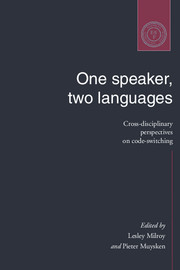Book contents
- Frontmatter
- Contents
- Notes on contributors
- Acknowledgments
- 1 Introduction: code-switching and bilingualism research
- Part one Code-switching in institutional and community settings
- 2 Bilingual speech of migrant people
- 3 Code-switching in the context of dialect/standard language relations
- 4 Code-switching in community, regional and national repertoires: the myth of the discreteness of linguistic systems
- 5 Code-switching in the classroom: two decades of research
- Part two Code-switching and social life
- Part three Grammatical constraints on code-switching
- Part four Code-switching in bilingual development and processing
- Index
2 - Bilingual speech of migrant people
Published online by Cambridge University Press: 05 June 2012
- Frontmatter
- Contents
- Notes on contributors
- Acknowledgments
- 1 Introduction: code-switching and bilingualism research
- Part one Code-switching in institutional and community settings
- 2 Bilingual speech of migrant people
- 3 Code-switching in the context of dialect/standard language relations
- 4 Code-switching in community, regional and national repertoires: the myth of the discreteness of linguistic systems
- 5 Code-switching in the classroom: two decades of research
- Part two Code-switching and social life
- Part three Grammatical constraints on code-switching
- Part four Code-switching in bilingual development and processing
- Index
Summary
Bilingualism and language contact phenomena have attracted a lot of attention over the past decades and research on bilingualism is now well documented. Language contact research centres on different types of language contact situations and different forms of bilingualism. Nonetheless, most contributions appear to concentrate on a number of particular instances of language contact, and two main sociolinguistic fields of investigation seem to have attracted unequal academic attention. On the one hand, numerous studies have been devoted to observing the language behaviour of bilingual communities in long-established contact situations. Examples of such settings include indigenous linguistic minorities, whose languages survive within a higher-prestige language dominance (as Welsh and Gaelic speakers in Great Britain, or Alsatians in France; see for example chapter 4), or former immigrant populations (as Puerto Ricans in New York, or French-speaking Canadians in Ottawa; see for example Poplack 1980). A second research tradition focusses on the language behaviour of newly established populations, who settled in industrial urban areas largely as a result of labour migration during the years following the Second World War. In spite of some impressive research, there is still little known about the development of bilingualism and specific speech patterns in the latter context. Our emphasis here is on the complex issue of bilingualism in the specific contexts of labour migrations in Europe, and more specifically on aspects of the bilingual speech of two distinct Mediterranean groups of immigrants: the Iberian and Algerian communities living in France.
- Type
- Chapter
- Information
- One Speaker, Two LanguagesCross-Disciplinary Perspectives on Code-Switching, pp. 17 - 44Publisher: Cambridge University PressPrint publication year: 1995
- 20
- Cited by



